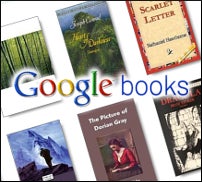 |
With a couple of key deadlines approaching, Google has been scrambling to defend its controversial settlement with authors and publishers to clear the way for its ambitious Book Search project.
Google (NASDAQ: GOOG) had given authors until today to opt out of its settlement, the same day the federal court reviewing the deal set as a deadline for interested parties to submit comments before it considers the matter at a fairness hearing Oct. 7.
In addition to the court review, the Justice Department has initiated an independent antitrust inquiry.
Then, this week saw the Federal Trade Commission step up its own involvement. In a letter sent to one of Google’s top privacy attorneys, David Vladeck, who heads the FTC’s bureau of consumer protection, said he appreciated the benefits of the Book Search settlement, but had “concerns about Google gaining access to vast amounts of consumer data regarding the books consumers search for, purchase and read.”
Vladeck called on Google to publicly disclose how it handles consumer information through the Book Search service, and to comply with the agency’s non-binding self-regulatory principles for behavioral targeting.
In an earlier exchange with the agency, Google had said that it does not currently use Book Search data for behavioral targeting, but would comply with FTC guidelines if it started to do so in the future.
Google, facing opposition on a variety of fronts, said last night it would comply with the FTC’s request, and posted a separate privacy policy for the Book Search project last night.
Jane Horvath, Google’s global policy counsel, noted that the policy was only a first draft, given that the settlement with authors and publishers awaits approval, so the Book Search product described in the privacy policy is not yet in its final form.
Horvath also pointed out that Google Book Search has always been covered by the company’s general privacy policy, but “we understand that the privacy of reading records is especially important to readers and libraries.”
European authorities are looking into the matter as well, though an EU official has disputed the characterization of its review as a “U.S.-type investigation.” Members of the European Commission are scheduled to convene on Monday to consider the deal, but the official told InternetNews.com that that proceeding is intended as a fact-finding exercise to educate the staff about Google’s project, rather than the initiation of a full-scale inquiry.
Nevertheless, it has become clear that some parties in Europe are vehemently opposed to Google’s project. Earlier this week, a lawyer in Germany’s Justice Ministry blasted the Book Search project for violating German copyright law in a filing with the U.S. court reviewing the settlement.
In addition to the legal and regulatory attention the Book Search settlement has attracted, the deal has also started something of a food fight in the tech and book industries.
In partnership with the nonprofit Internet Archive, Amazon (NASDAQ: AMZN), Microsoft (NASDAQ: MSFT) and Yahoo (NASDAQ: YHOO) have formed a coalition to oppose the settlement. The Open Book Alliance has also enlisted the support of groups representing writers, publishers and libraries.
Google reached its settlement with the Authors Guild and Publishers last October. In the $125 million settlement, which resolved a three-year-old copyright dispute, Google said it would create a registry for authors claim their works and receive revenue from the Book Search agreement.
Critics have argued that the agreement will create a near monopoly in the digital book space, giving Google the right to gouge libraries and schools for access to the service, and handing it exclusive rights to so-called orphan works, in-copyright books whose rights-owners cannot be found.


